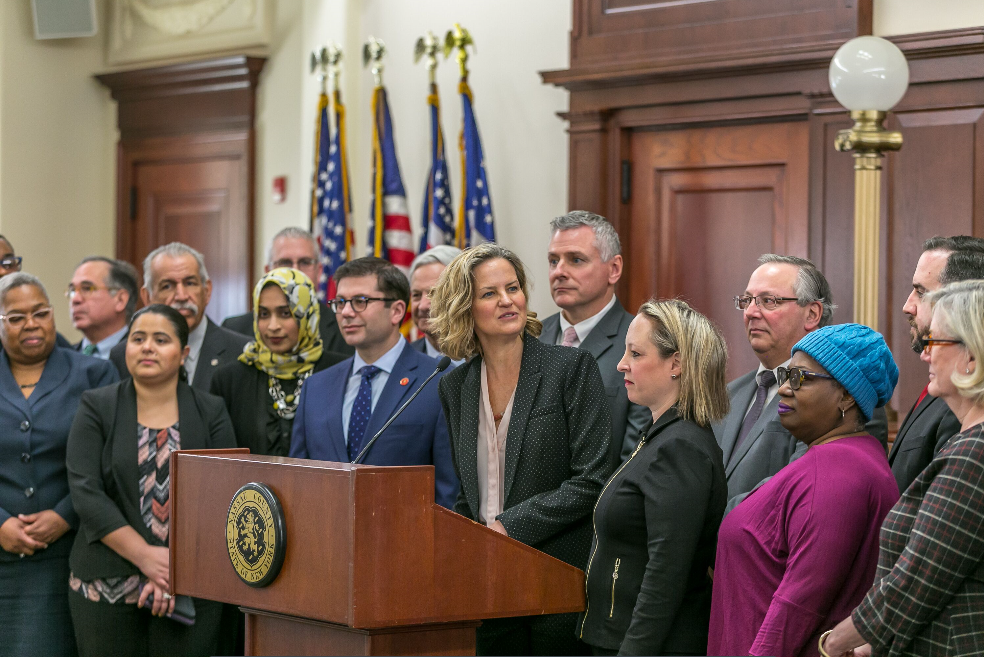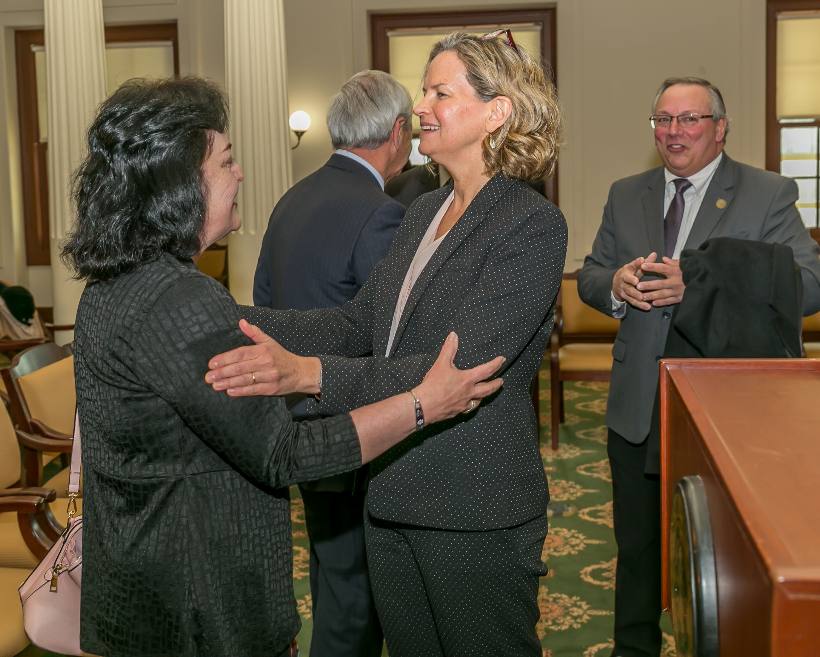NASSAU COUNTY’S COMPLETE COUNT COMMITTEE TO LEAD PREPARATION FOR 2020 CENSUS
Mineola, NY – Nassau County Executive Laura Curran today announced she has established the Nassau Complete Count Committee and launched the Make Nassau Count Campaign. She was joined by David Okorn, Executive Director of the Long Island Community Foundation, Rebecca Sanin, President & CEO of the Health & Welfare Council of Long Island, Jeff Behler, Regional Director at the U.S. Census Bureau, and over 30 of the newly established Nassau County’s Complete Count Committee. The Committee is tasked with driving the Make Nassau Count Campaign, including developing messaging and strategies for achieving full participation, navigating technological barriers, and advocating for funding for census related work. Through the support of the Long Island Community Foundation, the Health and Welfare Council of Long Island will provide key leadership in the convening and administration of the Committee.
“We must work together to ensure every single Nassau County resident is counted in the 2020 Census,” said County Executive Curran. “We cannot overstate how important this is for state and federal funding, non-partisan redistricting and other issues critical to our County over the next decade and beyond.”
"We applaud the leadership of the County Executive in establishing a committee to raise awareness, debunk myths, and support efforts to ensure an accurate and fair population count for Nassau County because census data affects so much of what matters to us and our region,” said David M. Okorn, Executive Director of the Long Island Community Foundation. “An accurate population count is especially important to our hundreds of donors who support education, the arts, environmental protection, food programs, and other safety net programs – as their generous donations cannot get it done alone; appropriate government funding that is informed by the Census is critical.”
“Census data has political, economic, and social implications necessitating every Long Islander to consider themselves stakeholder – ensuring that every family member, neighbor, and colleague understands the critical importance of Census participation to the future of Long Island,” said Rebecca Sanin, President & CEO of the Health & Welfare Council of Long Island.
“We are very excited to be a part of this important initiative and to use data from our demographic report to assist with the process,” Nassau County Comptroller Jack Schnirman said. “An accurate census count is crucial to ensure Nassau County receives its fair share of federal funding.”
“The 2020 Census will provide numerous opportunities to represent and support your community,” said Jeff Behler, Director of the New York Regional Office of the U.S. Census Bureau. “From working directly for the Census, to serving as a trusted voice, to partnering with local leaders, the Census will allow every community the opportunity to stand up and be counted. And the next ten years will depend on it.”
“Ensuring a fair and accurate count in the 2020 Census is important to our economy as the data is used to allocate federal and state funds to our region, and businesses rely on the demographic information to find customers and workers,” said Kevin Law, President & CEO of the Long Island Association, a member organization of the Nassau Complete Count Committee. “Thus, the LIA commends County Executive Curran for leading the effort for an accurate count and why the LIA made support for an accurate census count one of its top priorities for 2019.”
The Committee, comprised of non-profit, labor, faith, and community leaders from a wide range of organizations throughout the County, will play a vital role in strategizing how best to ensure a complete count in Nassau.
The Make Nassau Count Campaign will have to tackle many new challenges for the 2020 Census. For the first time ever, self-responses will move to an online system, which will be unfamiliar and disconcerting to many residents, and possibly inaccessible for some residents in our hardest-to-count communities. Additionally, the threat of a citizenship question, whether or not it is ultimately included on the questionnaire, has already been a part of the conversation. With an estimated 112,143 foreign born non-citizens residing in Nassau County (or 8.3% of the total county population), this could potentially lead to major undercounts in a significant part of Nassau’s population.
“With these new challenges, it is vital that we prioritize getting the message out there to get counted,” stressed Curran. “That is why this Committee is so important: comprised of County departments, leaders in the health and non-profit sector, labor, faith, schools, libraries, and more, we need to put our heads together and strategize to ensure that every resident knows they count, and that they need to be counted in order to Make Nassau Count.”
Nassau County is the fifth hardest-to-count county in the State of New York, with approximately 23% of its population (or 316,116 people) living in what are classified as hard-to-count neighborhoods. Some of the County’s hardest-to-count communities include Hempstead, Freeport, Uniondale, Lakeview, Elmont, Valley Stream, Long Beach, Glen Cove, and Great Neck.
Census data is used by policymakers to identify a community’s needs and to distribute over $53 Billion annually in federal funding to New York state and its localities. This federal funding includes critical transportation and infrastructure dollars, and funding for many important programs such as Medicaid and Medicare Part B, the Supplemental Nutrition Assistance Program (SNAP), the National School Lunch Program, the Supplemental Nutrition Program for Women, Infants, and Children (WIC), Special Education Grants (IDEA), and many more. The census also provides statistics that are important to economic development and planning efforts and are used in proposals by local governments for competitive grant programs. Additionally, the decennial Census is used as the basis for equal political representation under the Constitution; fair redistricting and representation in Congress, the State and County Legislatures, and the Town Councils in Hempstead and North Hempstead all depend on an accurate count of the population. A complete count in the 2020 Census will ensure that a fair and non-partisan redistricting of the County Legislative districts can be implemented.


